
Bruce Perens is an American computer programmer and advocate in the free software movement. He created The Open Source Definition and published the first formal announcement and manifesto of open source. He co-founded the Open Source Initiative (OSI) with Eric S. Raymond. Today, he is a partner at OSS Capital.
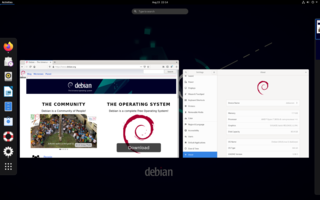
Debian, also known as Debian GNU/Linux, is a GNU/Linux distribution composed of free and open-source software, developed by the community-supported Debian Project, which was established by Ian Murdock on August 16, 1993. The first version of Debian (0.01) was released on September 15, 1993, and its first stable version (1.1) was released on June 17, 1996. The Debian Stable branch is the most popular edition for personal computers and servers. Debian is also the basis for many other distributions, most notably Ubuntu.

Free software is computer software distributed under terms that allow users to run the software for any purpose as well as to study, change, and distribute it and any adapted versions. Free software is a matter of liberty, not price; all users are legally free to do what they want with their copies of a free software regardless of how much is paid to obtain the program. Computer programs are deemed "free" if they give end-users ultimate control over the software and, subsequently, over their devices.

GNU is an extensive collection of free software, which can be used as an operating system or can be used in parts with other operating systems. The use of the completed GNU tools led to the family of operating systems popularly known as Linux. Most of GNU is licensed under the GNU Project's own General Public License (GPL).

A Linux distribution is an operating system made from a software collection that is based upon the Linux kernel and, often, a package management system. Linux users usually obtain their operating system by downloading one of the Linux distributions, which are available for a wide variety of systems ranging from embedded devices and personal computers to powerful supercomputers.

The LaTeX Project Public License (LPPL) is a software license originally written for the LaTeX system. Software distributed under the terms of the LPPL can be regarded as free software; however, it is not copylefted.
The Debian Free Software Guidelines (DFSG) is a set of guidelines that the Debian Project uses to determine whether a software license is a free software license, which in turn is used to determine whether a piece of software can be included in Debian. The DFSG is part of the Debian Social Contract.
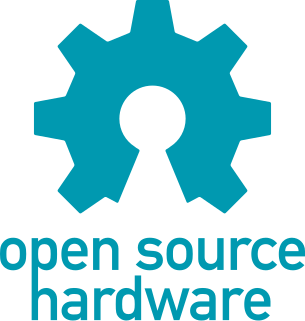
Open-source hardware (OSH) consists of physical artifacts of technology designed and offered by the open-design movement. Both free and open-source software (FOSS) and open-source hardware are created by this open-source culture movement and apply a like concept to a variety of components. It is sometimes, thus, referred to as FOSH. The term usually means that information about the hardware is easily discerned so that others can make it – coupling it closely to the maker movement. Hardware design, in addition to the software that drives the hardware, are all released under free/libre terms. The original sharer gains feedback and potentially improvements on the design from the FOSH community. There is now significant evidence that such sharing can drive a high return on investment for the scientific community.
The MicroBlaze is a soft microprocessor core designed for Xilinx field-programmable gate arrays (FPGA). As a soft-core processor, MicroBlaze is implemented entirely in the general-purpose memory and logic fabric of Xilinx FPGAs.

gNewSense is a Linux distribution that was active from 2006 to 2016. It was based on Debian, and developed with sponsorship from the Free Software Foundation. Its goal was user-friendliness, but with all proprietary and non-free software removed. The Free Software Foundation considered gNewSense to be composed entirely of free software.

Openmoko is a discontinued project to create a family of open source mobile phones, including the hardware specification, the operating system, and actual smartphone development implementation like the Neo 1973 and Neo FreeRunner. The whole project was sponsored by Openmoko Inc.

A free-software license is a notice that grants the recipient of a piece of software extensive rights to modify and redistribute that software. These actions are usually prohibited by copyright law, but the rights-holder of a piece of software can remove these restrictions by accompanying the software with a software license which grants the recipient these rights. Software using such a license is free software as conferred by the copyright holder. Free-software licenses are applied to software in source code and also binary object-code form, as the copyright law recognizes both forms.

The GNU Free Documentation License is a copyleft license for free documentation, designed by the Free Software Foundation (FSF) for the GNU Project. It is similar to the GNU General Public License, giving readers the rights to copy, redistribute, and modify a work and requires all copies and derivatives to be available under the same license. Copies may also be sold commercially, but, if produced in larger quantities, the original document or source code must be made available to the work's recipient.

FreedomBox is a free software home server operating system based on Debian, backed by the FreedomBox Foundation.
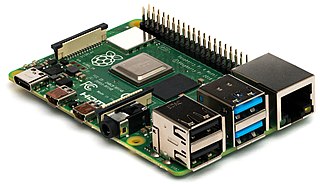
Raspberry Pi is a series of small single-board computers (SBCs) developed in the United Kingdom by the Raspberry Pi Foundation in association with Broadcom. The Raspberry Pi project originally leaned towards the promotion of teaching basic computer science in schools and in developing countries. The original model became more popular than anticipated, selling outside its target market for uses such as robotics. It is widely used in many areas, such as for weather monitoring, because of its low cost, modularity, and open design. It is typically used by computer and electronic hobbyists, due to its adoption of HDMI and USB devices.
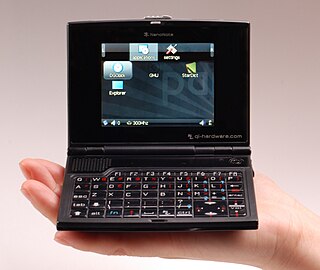
The Ben NanoNote is a pocket computer using the Linux-based OpenWrt operating system. An open-source hardware device developed by Qi Hardware, it has been called possibly "the world's smallest Linux laptop for the traditional definition of the word.". In addition, the Ben NanoNote is noteworthy for being one of the few devices on the market running entirely on copyleft hardware.

The DragonBox Pyra is an upcoming Linux-based handheld computer equipped with a keyboard and gaming controls. The project entered prototyping stage in 2015. Pre-orders began on 1 May 2016, with a final release date still undefined. As of August 2020, the first production model has been shipped, but only to developers; the software is not yet ready to ship.
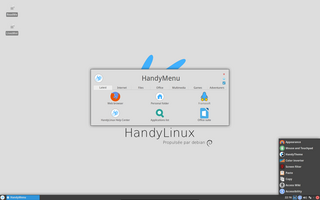
HandyLinux is a Linux distribution originating in France and derived from the Debian stable branch. It is designed especially with inexperienced computer users in mind. The distribution has low system requirements, allowing it to be used on a range of older hardware that is no longer supported by the latest versions of proprietary operating systems. It is aimed particularly at older people with dated hardware who do not need or possess the skill to use many features afforded by state-of-the-art operating systems. It may also be useful for computer users with disabilities, such as visual impairment.
SONiC is a free and open source network operating system based on Linux and developed by Microsoft and the Open Compute Project. SONiC includes the networking software components necessary for a fully functional L3 device and was designed to meet the requirements of a cloud data center. It allows cloud operators to share the same software stack across hardware from different switch vendors.















